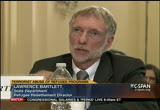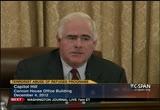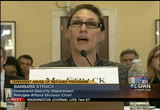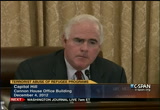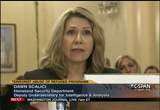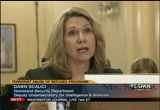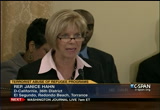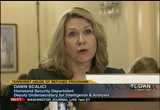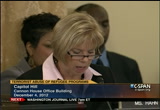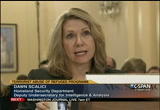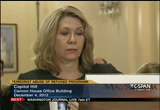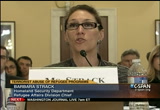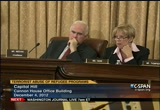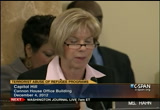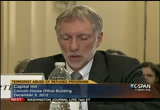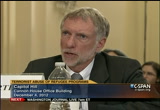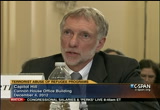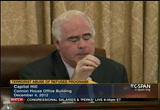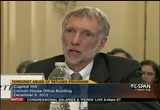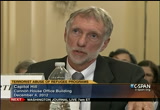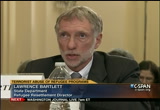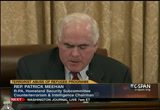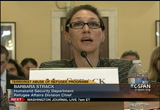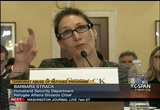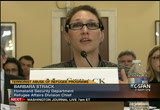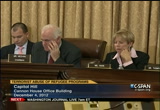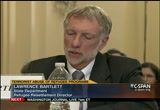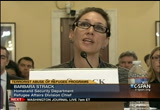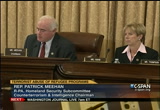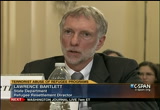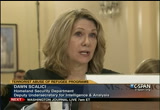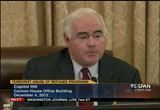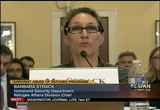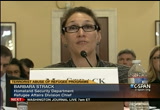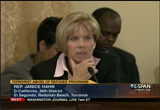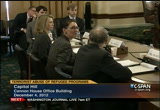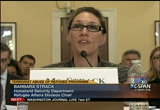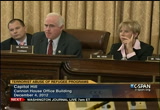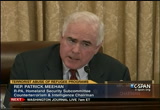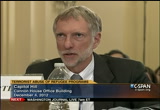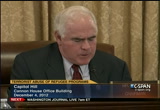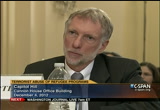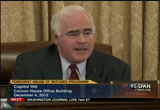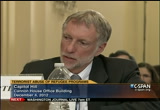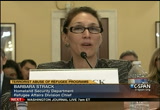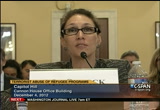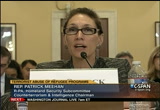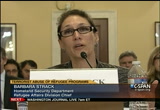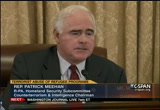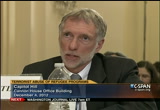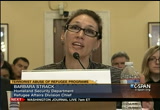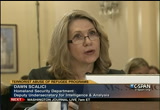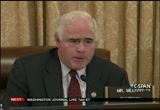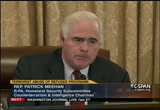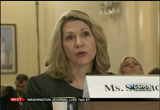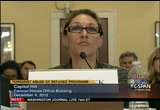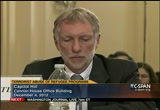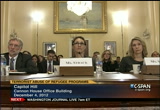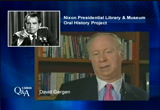tv Washington This Week CSPAN January 6, 2013 6:00am-7:00am EST
6:00 am
available from us from those very checks. when my colleagues talk about using databases, fingerprint data bases from iraq, those are definitely used for iraq refugees. that is the discriminating factor, the types of intelligence holdings that we have and our ability to pin against those holdings. the second question about what is being done for those that have already arrived, i would defer to my dhs colleagues who have been much more involved on that issue. >> there is a basic intelligence that exists pretended to those countries that have terrorist activities. is that accurate? >> i would like to start with an operational response and invite
6:01 am
my colleagues to speak more in depth on the intelligence front. i would say operationally, what you are suggesting, that the program ought to have a heightened scrutiny on iraqis is in fact what happens. this was a chronology and when the united states government announced a large-scale resettlement of iraqis in 2007, we immediately looked at what we should be doing in light of this particular population which was different, in nationality we had not been resettling a great deal. we looked at enhancements which could bring on board that would address this new population and that's when we created the partnership with d.o. de. later >> was this in 2007? >> will yes, later when we identified a new partnership with the counter-terrorism center, that was initially focused on iraqi applicants but
6:02 am
we learned by doing and we learned about the heightened level of checks and then we expanded to applicants of all nationalities. we use the iraqi program to raise the bar across the board for other nationalities. >> there were some 25,000 per year for a few years, isn't that right? >> i believe the high point was 18,000 ballots did you have the resources to do some kind of fairly thorough assessment of each of those 18,000 before they were able to be granted -- >> yes, sir, and that's where i would like to defer to my colleagues to explain in detail. >> i think it is fair to say that in 2007, the security and vetting program was strong but
6:03 am
not impervious and we have learned a lot since then. we have work with interagency partners to strengthen the programs we have in place. there is enhanced security vetting procedures. it expanded over time over high risk populations. we include all refugee applicants regardless of their country of origin. with the age ranges of 14-65. we believe the greatly enhanced security vetting which allows us to draw upon all relevant intelligence and other data on the applicant is greatly enhanced. at the same time, we recognize the fact that a number of iraqi refugees enter the country before the enhanced vetting procedures were put into place
6:04 am
by the interagency so we went back and did retroactive checks on those individuals that were earlier admitted to the united states in any relevant information that comes to light has been shared with relevant intelligence communities or law enforcement agencies as appropriate. not only do we have analysts who are looking at the relevant intelligence and data at the time an applicant originally put forward their application, but we review it again before that applicant actually enters the united states in case any derogatory information has arisen. we believe the interagency process drawing on more intelligence and data than before as well as the retroactive checks greatly enhance our ability to identify individuals of concern, thank you. my time has expired.
6:05 am
i will follow up with some questions. i recognize the ranking member for whatever questions she may have. >> thank you, i talked about the arrest of the iraqi refugees and how there was information available earlier that might have led us to believe that they could cause some trouble in our country. how did we miss that initial information? could you speak to what we are doing -- i hear vague comments about information sharing but we know that is key as we move forward. that was a lesson we learn from the 9/11. without divulging any classified
6:06 am
information, how did we miss that information the first time around? what can you tell us that would give us some confidence that we really are able to look at all the data available out there to make responsible decisions as we move forward in this program? >> for the two individuals of concern we have been talking about, at the time they made their original application to enter the refugee program in the u.s., both their biographical and biometric information that we had available at the time used in the screening process came in claim. we did not have a derogatory information on this. in fact, the fingerprint
6:07 am
clearance came through as well from dod, fbi, and vhs. >> even though their fingerprints were found on a roadside bomb? >> that's what we learned on and after -- in the aftermath. all the biographical and by a metric checks that were performed at the time came back clean. since that time, we have enhanced the program and the security checks and we now draw upon a greater wealth of intelligence in day to holdings on individuals seeking application to the refugee program which enhances our ability to identify derogatory compared to earlier. >> anyone else want to comment on that? other than the recent iraqi refugee case, has there been many open source cases of foreigners admitted through the
6:08 am
refugee or immigration program who have been associated with terrorism? is there any public evidence that terrorist groups are successfully exploiting this u.s.-refugee admission program? >> in that regard, we are concerned about the potential for terrorist groups to exploit the refugee program. we saw that in the case of the two individuals arrested in kentucky. in that case, we don't actually believe that those two individuals deliberately got into the united states through the refugee program. in the aftermath of their entrance to the united states, given their desire to support terrorist groups overseas and to
6:09 am
the previous terrorist involvement that had come to light, they were security risks. when we look at the potential and the future for terrorist groups to exploit the refugee program, we have concerns. we have the enhanced security and vetting procedures. we have intelligence test driven processes regardless of the immigration program that a terrorist act may see to use or travel to the united states. we are reviewing intelligence on a regular basis. >> with respect to your question about information sharing, we
6:10 am
are customers of the agency's that hold national security information. it is a tremendously cooperative relationship. we have relationships and the information flows and not only comes to us to help us make better decisions, there are instances where we can share information back. if there is a latent fingerprint that has been identified from an ied or some other terrorist-related purposes, if that individual appears as an applicant in the refugee program, we are able to associate a photograph of that person and the location of that person. we can address the watch list information in that regard. another division of uscis is fraud detection and national
6:11 am
security. it has set out an oliver program with other agencies. -- and a labyrinth program with other agencies -- an elaborate program with other agencies. that is a very important program to make sure that those agencies have the benefit of the immigration expertise embedded in their unit and they are the eyes and ears for uscis to make sure we get information from those kind of organizations. across the range of immigration benefits. >> are you working with our fusion centers? >> yes, ma'am. >> i get conflicting reports on the success of those. the ones where i come from in los angeles have been very valuable to provide extremely important information that i
6:12 am
believe has afforded some potential attacks. >> we agree. >> i know i am over time. i am a strong supporter of quick, immediate, and responsible drawdown of our forces in afghanistan. i really would like to speed up the time line. part of the irresponsible draw down include providing opportunities for the afghan people. as we wind that were down, what is your estimate of afghan refugees that may be seeking to come to this country? let us know how your resources are and if you feel that will be a major surge. the afghan refugees have been smaller in comparison to the
6:13 am
iraqi refugees. i want to hear your projection as we go forward. >> that's an interesting question. on the afghan front, the program we have that parallels the iraq program was legislated by congress. that program is still ongoing. it has frankly been a bit slow getting off the mark. over the last year, it had to to 25 of these is issued. -- 25 visas issued. the refugee situation in afghanistan is different than iraqi. most afghan refugees have found
6:14 am
shelter and protection in pakistan or iran. in the case of pakistan, we have supported the international efforts to help those refugees finding asylum in pakistan. most of those refugees are not seeking resettlement. unhcr has looked to see if there are pockets of refugees both in pakistan and iran there -- that are in need of resettlement. we started to resettle ravages from both countries. we have a small program out of iran. those people will be there to romania or slovakia. project a large increase for afghanistan but we continue to help unhcr and neighboring countries providing asylum to see where individuals
6:15 am
can be helton said large waves of refugees. >> mr. bartlett, you identified you have a two-step process -- to identify those who are eligible for this consideration and to ensure they don't present a risk. explain how you identified when and how somebody is eligible for this process and the first place? >> that is more than a one-step process. our largest partner is the un high commissioner for refugees and the work throughout the world. >> is that an american project organization? >> this is an international organization. they operate in countries of refugee outflows as well as countries where refugees are received. >> am i correct to say we have
6:16 am
an international organization that is determining who should be emigrating to the united states? >> it would not be exactly correct but we work closely with unhcr in this regard to look at populations in need of resettlement. they are located in camps. they are at the ground level. there are hundreds and thousands of refugees around the world who don't have a hope to go home anytime soon. >> how do you distinguish between them? we are now looking at jordanians, syrians, and nobody knows what will happen with egypt. how do you determine who may be able to find refuge within their region as opposed to the united states being the source of
6:17 am
refuge? >> this is a diplomatic and humanitarian effort. we expect that countries will preside -- provide asylum for refugees if they ask. not all countries are able to provide long-term support. that is something we will engage bilaterally in terms of government but we will also work multilaterally through the un and other partners. you bring of syrian refugees -- syrian refugees right now have moved principally into turkey and lebanon but some have moved into jordan and those countries are hosting those refugees and we are supporting that effort. any refugee would like to go home. their first preference is to go home to their families and their own countries. we tried to support the effort to help people.
6:18 am
to remain in those places and have protection and services so as the situation changes and hopefully they can return home as violence subsides. we're not looking to resettle syrian refugees but we look to individuals who may have protection concerns in turkey or 11 on and cannot stay there safely. -- in turkey or 11 on and cannot stay there safely. -- or lebanon. if the situation becomes protracted as it did with the iraqis, countries are sometimes unable to host people for extended periods of time. after six years or so, we look at who might be eligible for settlement.
6:19 am
>> i interrupted you with regard to the criteria of eligibility. is there a specific criteria will you look at to make those determinations? >> there are. our program prides itself on the fact that we look largely and vulnerability. we look at protecting people who are vulnerable in a country. our program provides a fairly broad range of services once people arrive so we work with them to help anchor them in the u.s. and help them gain self- sufficiency. in terms of looking at criteria, we look at the vulnerability of their inability to stay in a situation of temporary asylum and their inability to go home. as the situation becomes redacted and somalia is a good example, we know there will be a -- the damage -- the democracy
6:20 am
of congo is another example, they will not have an opportunity to go home soon so we look at the populations within the large community to see who is the most vulnerable. often women are at risk who are without a husband and a they have children and they have protection concerns. we will look at that population or to identify those people. sometimes people with medical conditions that cannot be treated in a camp makes them more vulnerable and would look of those populations. it is a broad an array of vulnerabilities. >> could you identify -- you were talking about those who are eligible for consideration. there has been an identification with an emphasis of those who
6:21 am
have participated in assisting u.s. efforts either in the military intelligence or otherwise who put themselves into some peril. what is the distinction between those are humanitarian vs. those who have performed for the benefit of our interests and are, therefore, being some consideration because of the exposure that may result from that service? >> the siv program is often conflicted with the refugee program but it is distinct. >> can you explain what siv
6:22 am
stands for? >> it stands for special immigrant visa program. on like the other programs, the fundamental focuses on whether someone has been persecuted. it is based on a protected category like race, religion, political opinion, or membership in a social group. the siv program is based on service with the united states. this is something mr. bartlett is more of an expert on. congress legislated a program to say that those who have worked for the united states government -- there are three sub categories within the program -- initially it was small if you were a translator with the military and then expanded beyond that.
6:23 am
it is the fact of their service with the united states that makes them eligible. when they come to the united states, both our agencies handle this and they don't come as a refugee. they, as a lawful, permanent resident so they get a green card. based on their service. there are some individuals who may be eligible to apply for both programs. we work on the refugee side of the program the individuals may choose which of those two avenues is better for them, which operates more quickly dependent they are in iraq or -- >> today operate on a parallel
6:24 am
track or is there a preference given to someone who has served as an interpreter for our troops out in the midst of the mountains in afghanistan? do they get a preference? >> they do operate on a parallel track. an individual who is eligible has the opportunity to file for an siv with the state department. in the refugee program, having worked with the united states or a u.s.-affiliated organization is one of the criteria that can help you get access to the program but it is not the sole criteria. >> this has been such a good hearing and a serious issue. we want to make sure that we
6:25 am
continue this program -- these programs -- ensuring the safety of the refugees and the safety of the americans. have you been briefed on any possible effect that sequestration might have on the departments and these programs? >> at the state department, we have looked at overall sequestration. i know that our program has been adequately funded in the past. our expectation is that, in the coming year, that the program should be able to continue at similar levels. it would be hard to say it would be at the same level. a lot of the infrastructure we have in place overseas and
6:26 am
domestically i think will remain. the question will probably be what happens in longer-term and i cannot answer that at this point. >> uscis is in an unusual position in that most of our programs including the refugee programs are funded through fees. that is what supports the refugee resettlement program for uscis. my understanding is that the interpretation of sequestration is that it most likely will affect appropriate funds but also our fee-funding. our budget office is in discussion with dhs headquarters on how it will affect us. >> thank you. we know our republican colleagues will do the right thing and make sure we don't go
6:27 am
over the fiscal cliff. i have complete confidence. >> as dubai. -- as do i. i appreciate as well -- there are so many aspects to this year and want to follow on a couple lines of questioning. i opened the by identifying this look into the past while of the same time we appreciate the continuing instability tore out the region as we go to the future. both create challenges to our immigration process, those who have already gained entrance to the united states, those who may be looking at in the future. i identified testimony from robert miller which was -- robert mueller -- it said individuals who may have resettled here in the united states that have some
6:28 am
association with al-qaeda in iraq. the report indicated that there were some 300 names of iraqi refugees for further investigation. mr. bartlett and then the other panelists, can you update this committee on the status of rii'' screening process and explain what steps were taken in the event of a person with refugee status having some sort of association with al-qaeda? >> i can assure you that there is close cooperation with all law enforcement agencies like the fbi. the data we hold in our systems is shared with them on these types of cases. our cooperation with the department home in security to further these kind of information sharing. i would need to return defer to
6:29 am
dhs with more specificity. >> in that regard, and mentioned to the retroactive checks we have under way, drawing upon a host of intelligence and other data and intelligence we have available on individuals who had been -- who had entered the country before the security checks were in place. if any derogatory information comes to light, the re-checked information is shared as appropriate. another has been several cases that the fbi has opened as a result of information that has come to light for in from -- for information on individuals settled here in the united states. i would have to refer to pboj for the status of those cases. >> it is said there were 58,000 people who had come into the country.
6:30 am
we know where they are in the united states? >> we know where they arrived. we have arranged with local agencies around the country to receive the refugees to provide additional support. largely, refugees stay in those initial places but what of the great things about coming to the united states is the freedom of movement and some refugees move. i'm not sure what dss has in terms of on board movement but is -- but it is one of the issues. people move in small numbers i am curious about what we know about those 58,000 who are already here and the extent to which we are going back. do we engage them or go back
6:31 am
historically and look at other information we have from other databases about what we knew about them prior to their time coming here? i am struck by the fact that there are other intelligence sources and maybe that's the way we found the two individuals who had a past association who had been opposed to arab military -- opposed to our military. what are we doing to look at the 58,000 who are here to determine if there was anything in their background that would raise suspicion? >> i would like to note that of the 58,000 reference, from the very outset, there was a very vigorous vetting. we went through by a graphic and biometric checks. fingerprint checks were part of the process of from day one in 2007 as were other quite
6:32 am
rigorous by a graphic and biometric checks. although some of those individuals were not subject to the latest enhancements, we look at the portion of them for the retroactive checks. the robust that it was in place from the very beginning in 2007. inevitably, there will be instances where information comes to light after a refugee has been admitted to the united states. we work very closely whether it is intelligence or law enforcement or our colleagues in immigration enforcement, depending on the information and circumstances, whether it is an investigation or criminal proceedings as in the kentucky cases or another alternative is an individual could be placed in immigration removal proceedings
6:33 am
and removed from the united states. solutions will be different under different patterns. refugees are obliged to come forward after one year and applied to adjust their status and apply for their green card. later in their immigration life cycle, that may apply for naturalization. at those junctures, when an individual comes back to uscis, those application benefits will also trigger additional vetting of the applicant so there is continuous vetting built in. >> john been or ever -- >> this is an interesting issue is tracking these refugees. when they come here. you said they are obligated to show up somewhere in one year
6:34 am
and a reply. do we know if that happens? what about the ones that don't? do we tried to reach out to them? if information does come to light after they are already here, let's say couple of years, what is our mechanism to know where these refugees actually have located? you said some move in that is the beauty of this country. how are we keeping track of these many thousands of refugees that are here if they don't automatically come back re-apply for their green cards? what do we have in place? what information does come to light and a particular person, how do we know where that person has located in this country? >> my understanding is that
6:35 am
there is not systematic tracking of refugees who come to the united states because they have gone too vigorous that thing before they arrive. we don't treat them as a subset class but there are resettlement agencies that were mentioned that one refugees come to the united states, there is an agency that is invited to welcome them and stays in touch with them and encourage of them at the 1-year mark to apply for adjusted status. we do not routinely track people. if someone comes to our attention through law enforcement or intelligence, very often that information itself may include information toward location. >> thank you.
6:36 am
you are right, we should not treat these people as a suspect or crawl. -- or criminal. if information comes to light, there's a little bit of vulnerability in this program. i don't know if there is any talk going for a better -- of a better way to keep track of refugees. >> do we have a record of individuals who have been denied access, who have sought status and by virtue of something in their past, were denied it? ? >> we maintain records and denied applicants. those records are included in dhs' biometric database.
6:37 am
if that individual is encountered again whether they are using the same identity or a different identity, it would be willing to identify them. >> is that more than a fingerprint, by metric? >> fingerprint and photograph. they would be identified that they were previously identified as a refugee applicants. >> can you explain the criteria for determining who gets the biggest security advisory opinion, what individuals, as you do the prescreening, seem to bring a higher level of scrutiny? can you explain what a suit -- security advisor position is? >> allow me one conversation.
6:38 am
sorry, we talked earlier about which information is classified and which is suitable for an open hearing. for the secure -- for the security advisory opinion check -- >> if you are uncomfortable talking about any kind of issue, you have been conversant with this and i am not against the possibility of entertaining the kind of question in a different environment. i believe we want to create a level of comfort that we're doing things on both ends. if you are comfortable, i would like you to discuss it. >> at the outset, every refugee is subject to the consulate
6:39 am
lookout check. there is information that might be in that cls check that could give us a security adviser opinion. that has holdings in various intelligence agencies that would indicate a more rigorous examination of their background. security advisory opinion check is run on other applicants and that is what we would nude -- would need to talk about in a classified setting. it is one that is run on many refugees but not all and gives us additional information if there is derogatory information. >> what do we know about an applicant's? this is one thing i struggle with his understanding the predicate knowledge about
6:40 am
someone may come from -- how do i distinguish when i go back with people who have worked with our government over a period of time and there's already a relationship and i know the dod will talk about individuals and of firm that had participated with this person. i look toward others who, properly seeking refugee status. how do we determine that they actually have the beliefs or relationship of some particular group or others that qualifies them? what predicate level of information is pursued about someone and do we have adequate resources to do it to the extent it is probably necessary? >> the process by which refugees are identified and processed is methodical. it is sometimes long. we don't really apologize for
6:41 am
the length of the process because it allows us to be more thorough. we work closely with partners on the ground. the un is one but sometimes local u.s. embassies. tois sometimes with ngo's, identify refugees that are in need of resettlement and then we have nine contractors overseas located in regions throughout the world who are responsible and are contractors responsible for collecting additional information on each refugee family, be it an individual or family, information is collected and that is when we begin a lot of the screening processes. >> how proactive is that? when i was appointed united states attorney, the fbi sent people to talk to my eighth grade classmates. they talk to people i went to high school with, nabors that lived on my block and i was 10. that is for a secure position of
6:42 am
responsibility in the united states government. i am curious to the extent to which -- there is sort of a vetting and it there is a kind of inquiry to understand who this person was in their previous community? >> the beginning of this process is a collection of information on each refugee or their family and try to develop the individual information about that family and we look at family tree information, who they are related to, collection of fingerprints' of some point. at the individual level, it is collected and that is when the process starts. the next. in the process, department of homeland's security comes in and
6:43 am
conduct additional interviews face to face with the u.s. officer usua. >> as you discuss that process, to the extent you can identify how that interview is designed to elicit the kind of information that will allow us to ask the next logical question about some of his background? >> yes, sir. the information we have on refugee applicants does very uncertain regards. there are basically three different ways that individual can access the u.s. refugee resettlement program. lowry has talked about two of the three. one is the u.n. refugee agent who can refer cases to us. in some cases, that may be an individual than unhcr knows
6:44 am
there is an individual that has been a refugee camp for 20 or 30 years. that individual has come forth and shared the story of persecution or flight. they have been in the camps and had rations for 20 years and talked about who their family members are so there is a long record on who that person is the for resettlement to the united states has been talked about. when we do the interview with that kind of family, you'll have that record in front of us and we can elicit testimony and see if the things that are telling us are consistent with the record and store they have been telling to the un refugee agency over a period of time. beckham give us greater confidence that the information we are a listing is true and accurate. in other cases, we may encounter an iraqi applicant who has fled more recently. iraqis tend to have a great deal of documentation.
6:45 am
when we see an iraqi refugee, we often have a passport or a national i.d., may be a military booklet in addition to possibly a record with unhcr and they tell us they worked with the embassy or an american company. then we have an ability to confirm their claims to employment history. it really runs the gamut in terms of the tools we have. >> in light of the engagement we have with the governments of iraq and afghanistan, do we have any access to legacy government -- a legacy records of those governments? >> we do have access to some information of the former iraqi government. i cannot speak to afghanistan. we have seen fewer of those
6:46 am
cases and not familiar with that of the top of my head. in some instances, we can access that information. we spend a great deal of time with our staff training them to be rigorous in terms of illicit in testimony. -- eliciting testimony. we have found instances where people had a previous affiliation with the u.s. government or military and we vet those individuals nonetheless just the way we would vet another individual. some individuals may have been fired for cause or derogatory information. even in a case where someone has documented higher employment with the u.s. government or u.s.-affiliated entities, we
6:47 am
still go through the fall suite of security checks. theas we move forward recognition of the continuing unrest in countries like syria and jordan, if we anticipate that there may be more demands for the opportunity to be considered as refugees for either purpose to come into our country, are we and possession of the capability now in light of the fact that we have resources that are screening those in iraq and afghanistan -- do you have the resources on the ground to be able to sufficiently identified and do the kind of background work that needs to be done anticipating
6:48 am
you may get people from a broad variety of countries who are seeking asylum -- refugee status in light of the destabilization? >> perhaps i could start on the pierre process. my colleagues at dhs and talk more about the screening ever but certainly, in the middle east we have strong partners. we have a major partner located in jordan. we have a major partner located in istanbul, turkey. we have sub-offices in baghdad and lebanon, we have the capability to receive refugees and take initial screening information and to move them through the process and the system. on the security side, i would defer to my dhs colleagues on
6:49 am
their ability to be ready for that potential. >> as you know, the refugee program every year, the size, is determined after consultations with congress. this year, the ceiling is 70,000. there will be an interagency conversation and then make conversation with congress. we feel that we have the resources we need at uscis to handle 70,000 admissions this year and next year the ceiling will be set and taking resources into account, i cannot speak directly to the vetting agencies. that is for them to say but i can tell you that we know a number of our investing partners have increased their staffing over the last year and a half or
6:50 am
two. in connection with his workload to be sure their staff can be partners with us in this effort. >> this is a resource-intensive effort that we have in place to do the enhanced checks on all the refugee applicants. we have worked across enter agencies and the intelligence community and we believe we have the resources in place now to support the refugee program as currently configured. i would have to defer to them if the program were to grow much larger. we continue to learn and the copper -- and collaborate well with our interagency partners and we look to find ways in which we can automate the process to a greater extent and
6:51 am
streamline the processes so that, over time, the amount of manpower devoted to the effort can perhaps go down. >> i think it is important to note for the record -- we have been asking some probing questions and asking you to, more or less, present your confidence that something in the future might not happen by virtue of allowing the refugees here. i think it is important to identify the 3 million or so that you said have been resettled since the late 1970's -- is that accurate? there is the 58,000 since the iraqi bulge, said tuesday. we have identified a small number who have come to the united states and have been
6:52 am
investigated and concluded to have participated in a potential terrorist activity is no word they that is quite small. my closing question for you is -- we, on this committee, have never ceased -- i shouldn't say appreciative, but i would say cognizant of the extent to which al-qaeda and others constantly probing and look for opportunities to exploit our system and introduce acts of terror, not just against our interests and other parts of the country, but principally within the united states of america. to what extent can we feel comfort that al-qaeda is not looking at this program as a
6:53 am
backdoor way to work with somebody to get them in here into our country to planted them for -- to plant them - is this a way of getting them into the united states of america? >> i would agree that certainly al-qaeda and its affiliates have been innovative over the years in trying to identify what they consider vulnerability with gaps in the screening procedures and get individuals into the united states to do harm. that is why we have an intelligence-driven process to review intelligence on on a daily basis. in conjunction with interagency partners to actively identify the means of which al-qaeda or their affiliates can penetrate our defenses and identify
6:54 am
individuals or groups of concern that require increased screening. that is ongoing. we have comfort in terms of the increase of security vetting we have in place through the refugee program. it is not a static program. we continue to learn lessons and try to identify new sources of data and intelligence that would be relevant to the screening process. and to better secure our defenses in our program such as the refugee program. >> to either of the other two panelists have any other closing statements? >> i would just like to say briefly that one week launched a large-scale processing of the iraqi program in 2007, we recognized the compelling humanitarian need, but at the same time, we recognized that
6:55 am
bad actors will try to take advantage of any immigration program in the united states whether it is obvious or refugee programs for student visitor programs. we have striven over the years to be in the forefront of cooperation and collaboration with law enforcement and national intelligence communities. we now know program is impervious to we have tried our best to be forward-leaning and in the forefront and ready to innovate and learn from our experience in order to adopt the best protocol's weekend. >> thank you. >> i would like to thank you for your interest and the security screening processes we have put in place and for the recognition that improvements have been made. the security screening process not only protect the united states but also protect the
6:56 am
program and allows this country to provide ongoing protection to refugees who are in need of this. we thank you for your interest. >> let me conclude the hearing with the same observation i made at the outset which is to thank you for the work you do on a very, very challenging issue in which we balance the interest we have and continue to be a nation of refuge for those who we can include while at the same time appreciating the need to fulfill our first responsibility which is to protect the citizens of the united states against future harm. you are on the tip of the spare and i thank you for the diligent work you are doing and the improvements that continue to go into enhancing our ability to do so. i would like to conclude the hearing by asking the panelists
6:57 am
if there should be further questioning from your panel here today or others who were unable to participate, if they have written questions, we will keep the record open for 10 days. i ask that you be responsive. i am very grateful, again, for your participation today so without objection, the committee stands adjourned. [captioning performed by national captioning institute] [captions copyright national cable satellite corp. 2013] >> next, your calls them, "washington journal" and the band newsmakers and after that we will look at some of the congressional action and
6:58 am
reaction concerning the fiscal clef negotiations beginning with president obama. >> the big discussion that i remember was what is richard nixon going to do? >> he was scared to death. this was like a time bomb. it is a disaster if it gets out. >> he said john dean has brought me a list of 50 names. he wants a full field investigation and that is an unpleasant thing to happen. >> it was shortly after the farewell speech. al haig called me and he said we forgot one thing, we forgot a resignation letter. >> i said i would be glad to read it. >> he said you don't get it. you need to write it.
6:59 am
>> i thought the best way was not for me as an historian, was for the players, the key people from that era to tell the story themselves. i thought the best way to do this was to start a video oral history program that involve the the nixon players but also players and the watergate drama from the left and right and have them tell the story and use portions of that story in the museum to lead visitors understand the complexity of the constitutional drama about a former head of the nixon presidential library and museum details the library's oral history project tonight at 8:00 on >> this morning a roundtable discussion on the agenda for the new congress. then a look at the salaries of
134 Views
IN COLLECTIONS
CSPAN Television Archive
Television Archive  Television Archive News Search Service
Television Archive News Search Service 
Uploaded by TV Archive on

 Live Music Archive
Live Music Archive Librivox Free Audio
Librivox Free Audio Metropolitan Museum
Metropolitan Museum Cleveland Museum of Art
Cleveland Museum of Art Internet Arcade
Internet Arcade Console Living Room
Console Living Room Books to Borrow
Books to Borrow Open Library
Open Library TV News
TV News Understanding 9/11
Understanding 9/11